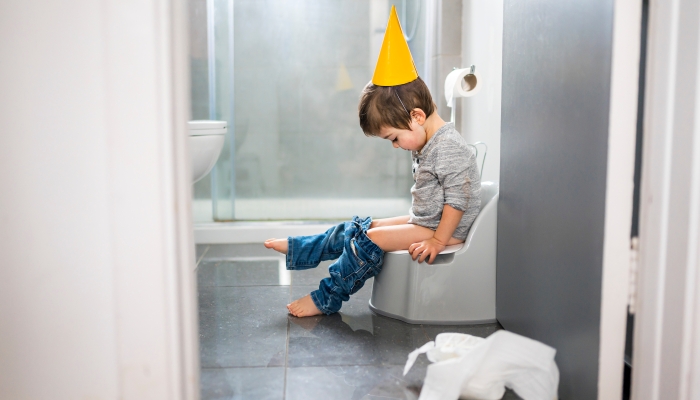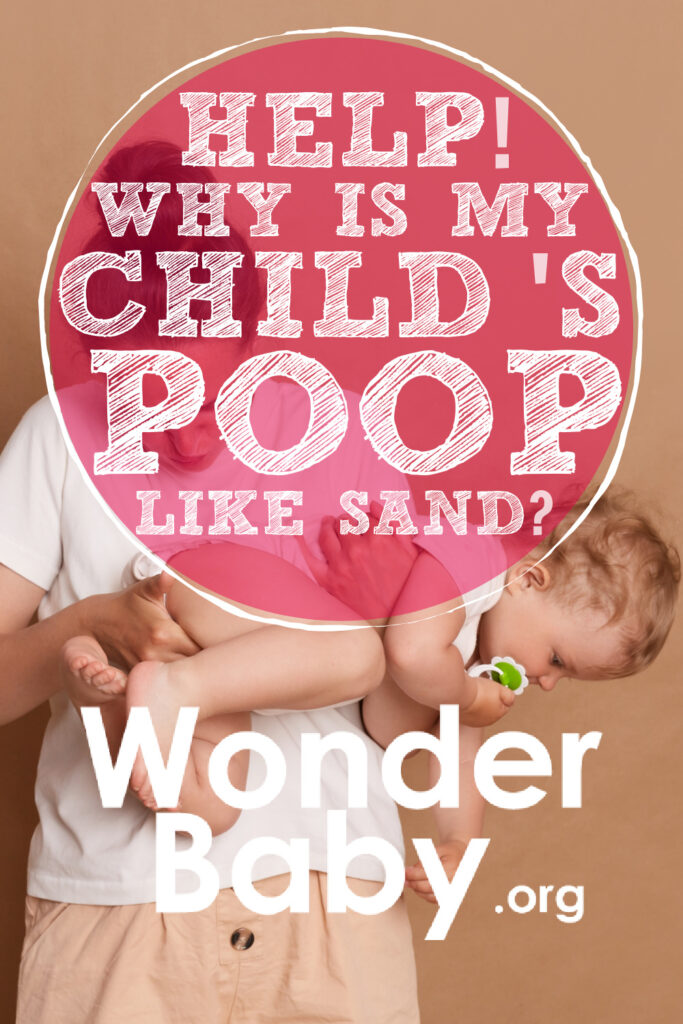Help! Why Is My Child’s Poop Like Sand?

- Monitoring bowel movements is a great way to monitor your child’s health.
- Sandy poop can indicate food moving through the digestive tract quickly.
- You can keep your child’s bowels healthy by keeping them hydrated and providing fiber-rich foods.
- Children with Celiac disease, inflammatory bowel disease, and irritable bowel syndrome may need medication or a special diet.
While nobody really likes to talk about poop, monitoring your child’s bathroom habits can give you a lot of information about their health. Many illnesses, both chronic and acute, cause changes in bowel movements.
Besides being uncomfortable, gastrointestinal problems can cause your child to miss out on essential nutrients, become dehydrated, and in severe cases, cause growth and immune system problems.
If your child has poop like sand, you may need to adjust their diet or speak to your pediatrician about potential gastrointestinal problems.
Why Is My Child’s Poop Like Sand?
There are many reasons for changes in a child’s bowel or bladder habits. One bowel movement with grainy poop may not be a cause for concern, but if your child is pooping out a sand-like substance on a consistent basis, they may need to see a doctor.

Dietary Analysis
The first thing parents can do for their child is to perform a dietary analysis. This simply means keeping track of what your child eats for a few days, and noting whether or not they have sandy stool. You may notice that stool consistency changes when your child eats high-fat foods or gluten.
If you notice a pattern, you can try eliminating the foods that cause GI distress.
Medical Causes
The gastrointestinal system is complicated and can be affected by many different things. Constipation, diarrhea, and grainy poop can all be caused by a variety of issues. Some of these might include:
- Stress
- Dietary changes
- Long-standing intestinal inflammation
- Gluten intolerance
- Crohn’s disease
- Celiac disease
- Kidney problems
- Liver problems
If your child experiences abdominal pain or weight loss in addition to having stool with a sandy appearance, a medical condition may be the cause.
Understanding Stool Variations in Children
While having regular, soft bowel movements is ideal, there are many variations of stool that are considered healthy.

Normal vs. Abnormal Stool
Experts at Children’s Health of Orange County11. Your child’s poop: An ultimate guide. CHOC. 2023. https://health.choc.org/your-childs-poop-an-ultimate-guide explain that normal stools for kids should be soft but formed, pass easily, and can be all shades of brown, yellow, orange, or green. Most children should have one bowel movement each day.
Many experts recommend using the Bristol Stool Chart22. Bristol Stool Form Scale. Pediatric General Surgery. https://pediatricsurgery.stanford.edu/Conditions/BowelManagement/bristol-stool-form-scale.html to identify whether or not their child’s GI tract is functioning normally.
Causes for Concern
Some signs in stool may require a pediatric consultation. These include:
- White or gray-colored stool
- Blood in stool
- Diarrhea or liquid stools
- Hard stools
- Pain or difficulty having a bowel movement
- Sandy or grainy poop
- Mucus in stool
- Fat absorption problems
While everyone suffers from constipation and diarrhea every once in a while, they should be infrequent and only last a few days. Researchers at the Cleveland Clinic33. Changes in Bowel Habits. Cleveland Clinic. 2023. https://my.clevelandclinic.org/health/symptoms/changes-in-bowel-habits recommend seeking medical care if any of these problems last for longer than two weeks.
Specifics of Sandy Poop
If your baby or child starts having sandy stools, try not to panic. While some digestive issues are serious, most can be managed by making dietary changes.

What Does “Sandy” Poop Indicate?
If your child is having sandy or grainy stools, this indicates that food is moving through their digestive tract too quickly. When food does not stay in the small intestine long enough, water and nutrients cannot be absorbed. This results in loose, grainy stools.
Potential Causes
Making big changes to your child’s diet can also change the consistency of their stool. Transitioning from formula to milk or adding solid foods can make a difference in your child’s bowel movements.
Sometimes, the body just needs a change to get used to the change in eating patterns. However, children with Crohn’s disease, Celiac disease, gluten intolerance, food allergy, or lactose intolerance will need to avoid certain foods for the rest of their lives.
Dietary causes of sand-like poop can include:
- High-sugar foods
- Too many fruits
- Fatty foods
- Caffeine
- Spicy food
- Sugar substitutes
Medical conditions that can cause sandy poop include:
- Taurine deficiency
- Kidney stones
- Liver dysfunction
- Certain medications
- GI tract inflammation
- Crohn’s disease
- Celiac disease
- Bile acid imbalance
Most of these medical conditions prevent the digestive system from properly absorbing foods and water.
When to See a Pediatrician
If your child’s stool is a strange consistency or color for longer than two weeks, you should take them to see a pediatrician.

Warning Signs
Most children with digestive system problems that require treatment will have more than one symptom. Weight loss or major appetite changes are common in children with serious digestive issues.
If your child experiences abdominal pain, blood in their stool, or shows signs of dehydration, take them to see a healthcare provider right away.
What to Expect During the Consultation
When you visit your pediatrician, they will typically perform a physical assessment including listening to and palpating your child’s abdomen, checking their mouth for signs of sores or dehydration, and measuring their weight and vital signs.
If your child’s pediatrician suspects liver or kidney dysfunction, they may need to take a blood sample to be analyzed in the laboratory. Blood samples can be checked for specific chemicals and electrolytes to help the doctor make a diagnosis.
Your child’s doctor may also give you instructions on how to collect a stool sample from your child and will ask questions about their digestive habits and recent dietary changes.
Home Care and Management
Some problems with grainy or loose stools can be managed at home by making dietary adjustments, ensuring adequate hydration, and encouraging kids to exercise.

Dietary Adjustments
You may have to make some adjustments to your child’s diet in order to manage their bowel problems. Knowing what to feed a toddler with diarrhea or other digestive issues can make a big difference.
Adding fiber, reducing sugar intake, eliminating sugar substitutes, and making sure your child eats a variety of vegetables are some of the best ways to improve stool consistency.
Hydration and Exercise
In addition to changing your child’s diet, ensuring that your child stays well-hydrated and gets enough exercise is vital to maintaining healthy digestion.
The Mayo Clinic44. Mayo Foundation for Medical Education and Research. Constipation. Mayo Clinic. 2023. https://www.mayoclinic.org/diseases-conditions/constipation/symptoms-causes/syc-20354253 recommends getting daily exercise to reduce constipation and improve digestive health.
FAQs
How can I differentiate between sandy poop and undigested food particles in my child’s stool?
Undigested food particles may occasionally appear in your child’s stool. This should only happen occasionally, and you will usually be able to identify food particles and match them to foods your child has recently eaten. While it’s normal for some food particles to appear in a stool, your child’s stool should generally be soft and formed.
On the other hand, sandy poop may be a light tan color, and the consistency of the entire bowel movement will be grainy or fall apart into small particles. While one sandy bowel movement is not a cause for concern, consistently sandy poop requires further investigation.
Is it normal for my child’s poop to change texture, like becoming sandy, when switching from breast milk to formula or introducing solid foods?
It’s normal for a child’s poop to change texture when you make major changes in their diet. In general, their body should get used to the dietary changes and stool should return to a normal consistency within a week or two.
If you change your child’s diet and their poop remains sandy for more than two weeks, it may be due to a food intolerance, allergy, or the development of digestive problems like Celiac or Crohn’s disease.
How long should I wait to consult a pediatrician if my child’s poop is consistently sandy?
If sandy poop is your child’s only symptom, it’s okay to wait for about 10–14 days before talking to a pediatrician. However, if your child has other symptoms such as lethargy, dehydration, fevers, abdominal pain, difficulty passing stools, poor appetite, or weight loss, you should visit your pediatrician right away.
What treatments are available for problems like Celiac disease, Crohn’s disease, and irritable bowel syndrome?
While these problems sound scary, Celiac, Crohn’s, and irritable bowel syndrome are all manageable problems. There are several medications available to manage symptoms of these problems, and dietary changes that may help.
Since each child is different and has different triggers for digestive issue flare-ups, you may have to experiment and work with a physician and dietician to find the best treatment options and dietary plans for your child.
Are formula-fed babies more likely to develop digestive issues or food intolerances?
Studies55. Xu, L., Lochhead, P., Ko, Y., Claggett, B., Leong, R. W., & Ananthakrishnan, A. N.. Systematic review with meta-analysis: breastfeeding and the risk of Crohn’s disease and ulcerative colitis. Alimentary Pharmacology & Therapeutics. 2017;46(9), 780–789. https://doi.org/10.1111/apt.14291 have shown that breastmilk does have a protective effect against the development of Crohn’s disease and ulcerative colitis. Other studies66. Barclay, A. R., Russell, R. K., Wilson, M. L., Gilmour, W. H., Satsangi, J., & Wilson, D. C.. Systematic Review: The Role of Breastfeeding in the Development of Pediatric Inflammatory Bowel Disease. The Journal of Pediatrics. 2009;155(3), 421–426. https://doi.org/10.1016/j.jpeds.2009.03.017 demonstrate that children who drink breast milk are less likely to develop irritable bowel syndrome. This is thought to be a result of the colonization of more helpful bacteria in the gut of infants and children who receive breastmilk.
References
- Your child’s poop: An ultimate guide. CHOC. (2023, March 6). https://health.choc.org/your-childs-poop-an-ultimate-guide
- Bristol Stool Form Scale. Pediatric General Surgery. (n.d.). https://pediatricsurgery.stanford.edu/Conditions/BowelManagement/bristol-stool-form-scale.html
- Changes in Bowel Habits. Cleveland Clinic. (2023, September 21). https://my.clevelandclinic.org/health/symptoms/changes-in-bowel-habits
- Mayo Foundation for Medical Education and Research. (2023, October 20). Constipation. Mayo Clinic. https://www.mayoclinic.org/diseases-conditions/constipation/symptoms-causes/syc-20354253
- Xu, L., Lochhead, P., Ko, Y., Claggett, B., Leong, R. W., & Ananthakrishnan, A. N. (2017). Systematic review with meta-analysis: breastfeeding and the risk of Crohn’s disease and ulcerative colitis. Alimentary Pharmacology & Therapeutics, 46(9), 780–789. https://doi.org/10.1111/apt.14291
- Barclay, A. R., Russell, R. K., Wilson, M. L., Gilmour, W. H., Satsangi, J., & Wilson, D. C. (2009). Systematic Review: The Role of Breastfeeding in the Development of Pediatric Inflammatory Bowel Disease. The Journal of Pediatrics, 155(3), 421–426. https://doi.org/10.1016/j.jpeds.2009.03.017

The information WonderBaby provides is not intended to be, and does not constitute, medical or other health advice or diagnosis and should not be used as such. Always consult with a qualified medical professional about your specific circumstances.
Related Posts

Eye Conditions and Syndromes, Visual Impairment
Neuralink Announces Plans to Restore Sight to the Blind with Brain Chip
Elon Musk’s company Neuralink has announced plans to begin human trials of its new “Blindsight” brain chip by the end of 2025.

Health & Nutrition
Can Baby Skin Care Products Expire?
Is that forgotten tube of diaper rash cream still safe to use? Learn more about the expiration dates of popular skin care products for infants.

Health & Nutrition
Boosting Immunity in Kids: 3 Tips for a Healthy Winter
Parents can help boost their kids’ immunity during cold and flu season by maintaining healthy eating, sleeping, and exercising habits in the winter.